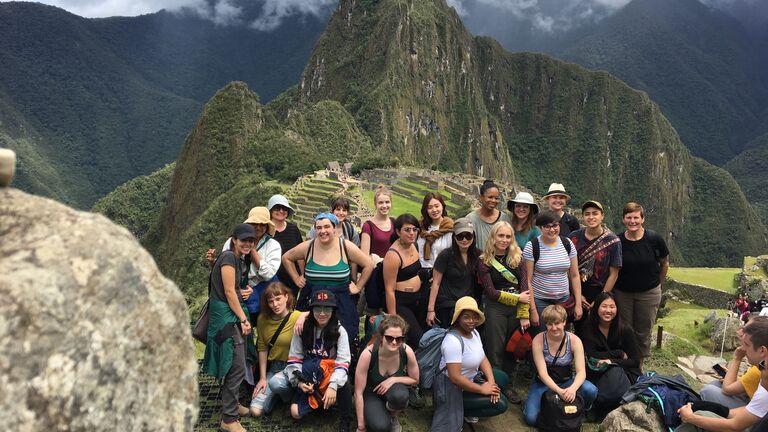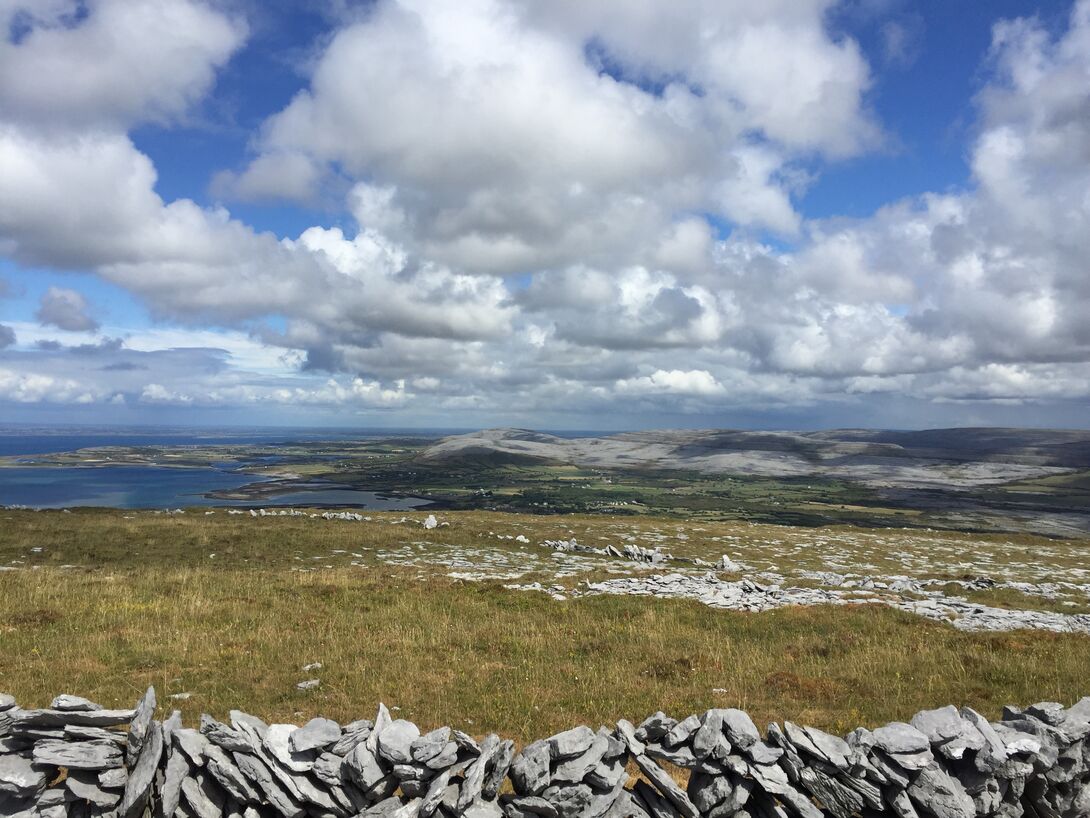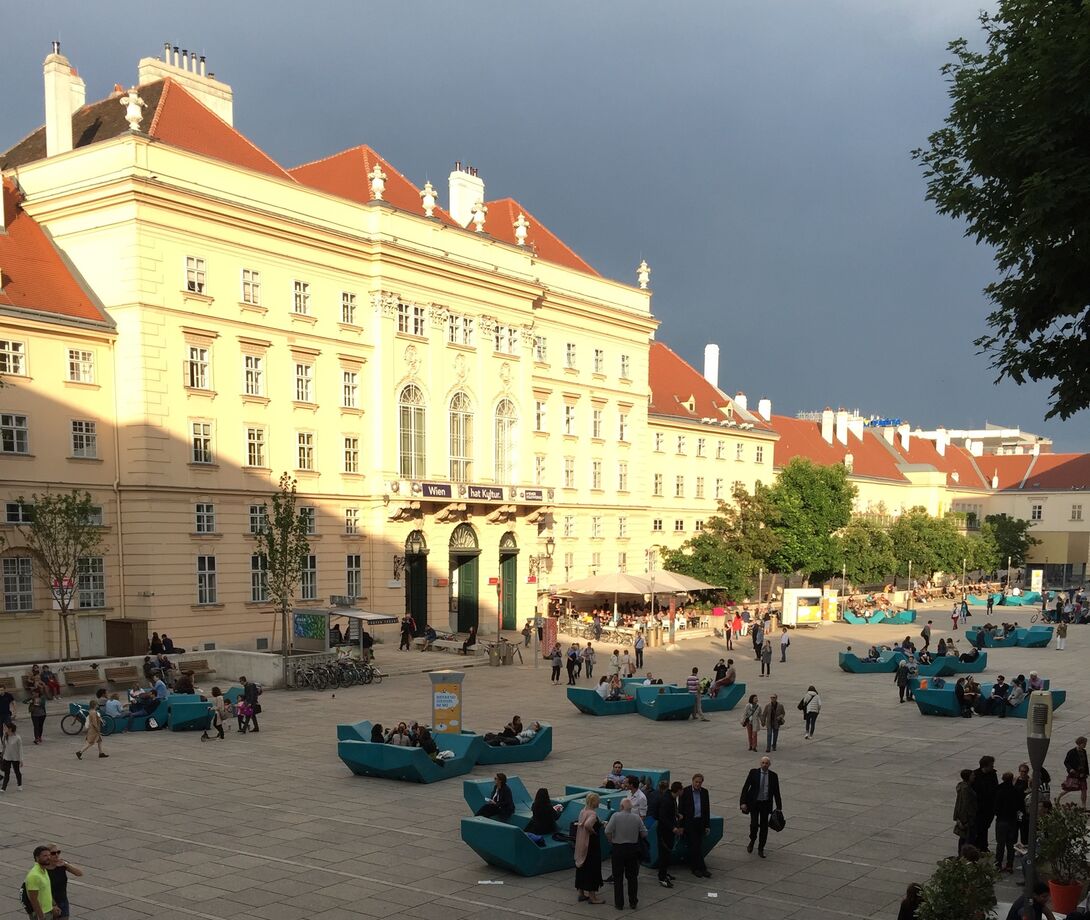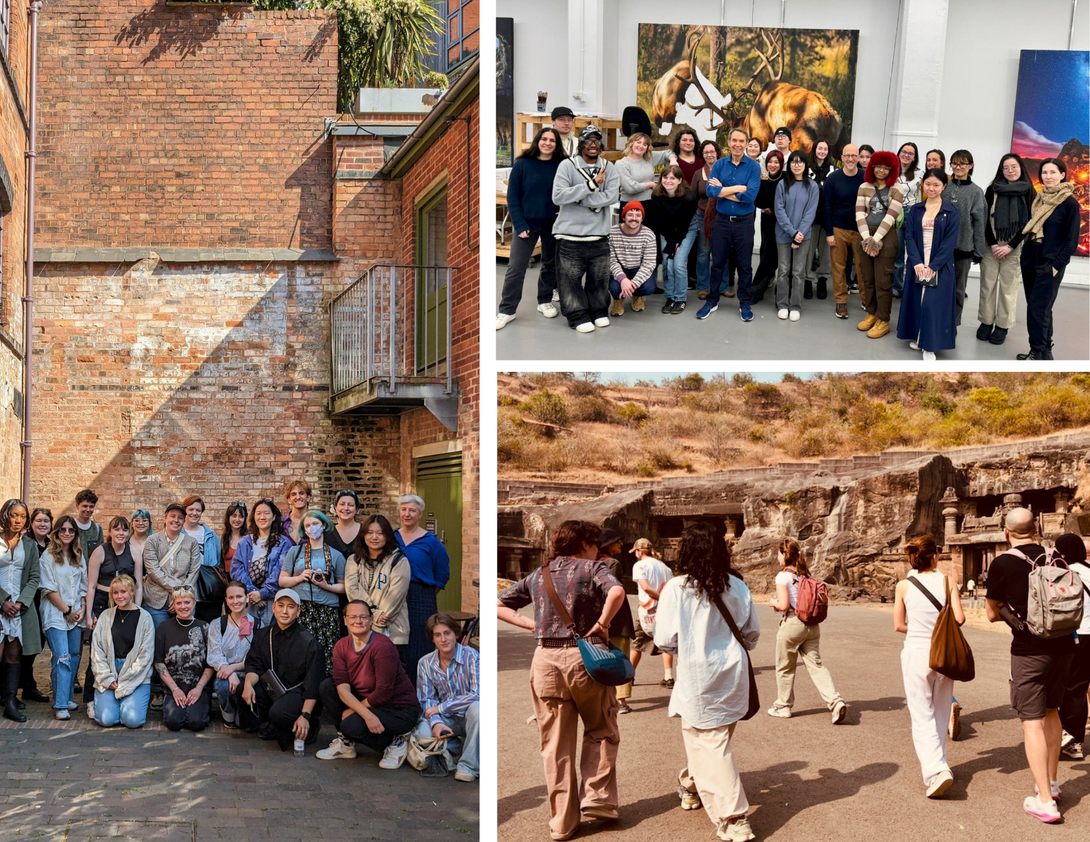
Study Trips
Faculty-Led Study Trips
Faculty-led study trips are credit-bearing courses taught by SAIC faculty where instruction takes place off-campus. Students can earn credits towards their degree completion and the off-campus study credit requirement.
Summer 2025
Study Abroad and faculty-trip leaders are excited to announce study trips that are planned for summer 2025.

MAKING WITH FIRE—CLAY|CRAFT|ART in SCANDINAVIA
Faculty: Marie Herwald Hermann, Associate Professor (Ceramics) and Henning Martin-Thomsen, Senior Lecturer (AIADO)
Dates: June 11–24, 2025
*Dates are subject to change
Credits: 3 or 6 cr Studio (3000 level)
Course level: Undergraduate and Graduate
Location: Copenhagen (Denmark), Southern Sweden
This study trip goes to Denmark, the southernmost of the three Scandinavian countries (Sweden and Norway are the other two). The title ‘MAKING WITH FIRE’ alludes to the particular focus on art, architecture, and design based on clay, whether it be ceramics or architecture, traditional or contemporary, all of which there is ample evidence of in Denmark. The primary base will be the capital, Copenhagen, consistently ranked as one of the world's most livable cities. We will also venture to the western parts of Denmark as well as to Southern Sweden for further explorations of clay and brick in all its manifestations, experience the varied landscapes and cities of the region, and study how culture, climate, landscape, and resources inform art, architecture, and design—on-site, in studios, in galleries, and in museums.
Highlights include the CLAY Museum in Middelfart, the brick cathedral in Ribe, one of the oldest towns in Scandinavia established in the 8th century, the renovated 13th-century brick Koldinghus Castle, the brand-new LEGO House in Billund by Danish architect Bjarke Ingels/BIG, filled with 25 million LEGO bricks and full of fun and exciting activities, and a visit to the equally new Hans Christian Andersen Museum in Odense (yes, the renowned author of fairy tales) by Japanese architect Kengo Kuma. On the itinerary is also a one-day visit to Southern Sweden and the stellar St. Petri Church by brick master architect, Sigurd Lewerentz, and the city of Lund, founded around the year 990. In addition a string of studio, gallery, and museum visits will help us dive into the art, architecture, and design of Denmark. We will be creative and have a lot of fun including playing with LEGO bricks and enjoying the very special Midsummer Evening festivities with singing and bonfires—‘MAKING WITH FIRE’ as it were. You don’t want to miss out on this study trip.
-
To learn more about the MAKING WITH FIRE—CLAY|CRAFT|ART in SCANDINAVIA study trip, please join Study Abroad and faculty trip leaders at one of the scheduled info sessions.
VIRTUAL
Wednesday, February 19
11:15 a.m.–12:15 p.m.
JOIN via ZOOMIN-PERSON
Thursday, February 13
3:30–4:30 p.m.
Sharp Building, 37 S. Wabash Ave., room 706 -
Tuition: SAIC tuition per credit hour (3 or 6 credits)
Estimated program fee: Approx. $3,400
The program fee includes some meals (breakfast is provided at all hotels, as well as some group meals), all accommodation and transportation during the trip, all entrance fees to cultural sites, and other course curriculum-related expenses. The program fee does not include airfare and personal expenses.Airfare: Approx. $1,000
The estimated price for airfare is based on flights leaving from Chicago to Copenhagen and may vary if a student is traveling from elsewhere. Airfare is not included in the program fee.

Studio Residency in Burren, Ireland
Faculty: Peter Power, Associate Professor (Printmedia) and Paola Cabal, Associate Professor, Adjunct (Painting & Drawing)
Dates: June 7–28, 2025
*Dates are subject to change
Credits: 3 or 6 Studio credits (3000 level)
Course level: Undergraduate and Graduate
Location: Ballyvaughan and Co Clare ( Ireland)
This three-week multi-disciplined studio-based residency will be in the Burren College of Art on the west coast of Ireland. The Burren is a UNESCO World Heritage Ecological Site known for its unique and dramatic landscape. Students have 24/7 access to their on-campus studios. The landscape and local culture will be engaged through hill walking, visits to noted archaeological sites, ceili dancing, and an overnight trip to the Aran Island, the most westerly inhabited location in Europe.
-
To learn more about the Studio Residency in Burren, Ireland trip please join Study Abroad and faculty trip leaders at one of the scheduled info sessions.
VIRTUAL
Monday, February 17
11:15 a.m.–12:15 p.m.
JOIN via ZOOMIN-PERSON
Wednesday, February 12
3:30–4:30 p.m.
280 Building, 280 S. Columbus Dr., room 120 -
Tuition: SAIC tuition per credit hour (3 or 6 credits)
Estimated program fee: Approx. $3,600
The program fee includes transport during the program, accommodation, some meals, all entrance fees to cultural sites, and other course curriculum-related expenses. The program fee does not include airfare and personal expenses.Airfare: Approx. $1,200–$1,500
The estimated price for airfare is based on flights leaving from Chicago to Shannon Airport and may vary if a student is traveling from elsewhere. Airfare is not included in the program fee.Student Testimonials:
"I was very happy with the course. It was a great mix of structured studio time and taking in the sights of Ireland. I know my art will be positively influenced from this trip many years from now. ""I was pushed out of my comfort zone because upon arriving to BCA resources are a lot more limited than SAIC. It’s rural and my creativity was challenged. By the time I looked back and realized just how far my art had come. "
"I was so pleased with this trip. There was a beautiful balance of site visits, studio time, individual time and group activities. I would encourage all students to experience this. The landscape of the Burren is beautiful and it truly changes you. I am so thankful for this experience."

Transcultural Territories: Austria, Czech Republic, Slovenia and Slovakia
Faculty: Prof. Mechtild Widrich, Chair (Art History, Theory, and Criticism) and Prof. Nora Annesley Taylor, Alsdorf Professor in South Asian Art History (Art History, Theory and Criticism)
Dates: June 14–28, 2025
*Dates are subject to change
Credits: 3 or 6 Art History credits (4000 level)
Course level: Undergraduate and Graduate
Location: Vienna (Austria), Brno (Czech Republic), Ljubljana (Slovenia), Bratislava (Slovakia)
This study trip will take us to Vienna (Austria), Brno (Czech Republic with a day trip to visit Mies van der Rohe’s Villa Tugendhat, 1929), and Ljubljana (Slovenia), with a focus on transcultural territories from the 19th century to today. The goal of this study trip is to gain an understanding of the cultural production of an area that has been shaped by migration and shifting borders for centuries, from the Reformation to the Cold War and today’s new nationalist and ecological challenges. How is cultural space negotiated and how does art intervene into the world?
Since the end of Communism in 1989, the region that used to be on the cusp of both Western and Eastern Europe has undergone enormous shifts, particularly in the art world. Vienna, Brno, and Ljubljana, bound closely under the Austrian Empire for centuries, then disconnected for half a century by the Iron Curtain, share complex historical interactions even as they have internationalized their art scenes through the opening of new museums, artist residencies, and the emergence of avant-garde scenes. Starting with world-famous cultural exchange around 1900 (such as Ljubljana’s city plan by Plecnik, Vienna’s Secession, Brno’s Villa Tugendhat), after World War II these countries developed independent practices in performance, film, installations, and video, with Yugoslavia acting as a major player in the development of computer art, Czechoslovakia at the forefront of performance, and Austria pioneering body art, Actionism, expanded media, and social practices.
Today, these cities are vibrant, international, and idiosyncratic: the 1980s and ‘90s saw a crossover between music and art, while questions of the history of multi-culturalism shape a political intersectional art practice. The Austrian Empire consisted of many languages, religions, and ethnicities, while today’s region again shows a vibrant Jewish community, and a new generation of residents from Turkey, Serbia, Syria, Afghanistan, but also Asia and Africa. The city of Vienna is at the forefront of tackling issues of climate change, with architectural and ecological projects at the intersection of community engagement and infrastructural reform. This, of course, is not without tensions and challenges, in particular the question of which (shared) histories remain to be told. Comparable topics such as immigration, resettlement, architectural expansions, the legacy of the Cold War, and new urban master plans, will be the perfect lens to understand the relevance of contemporary art in opening up the discourse, pushing back against racism and marginalization of immigrant groups, and discussing projects that deal with belonging and the future of an ecological being-in-the-world.
-
To learn more about the Transcultural Territories: Austria, Czech Republic, Slovenia trip please join Study Abroad and faculty trip leaders at one of the scheduled info sessions.
VIRTUAL
Tuesday, February 18
11:15 a.m.–12:15 p.m.
JOIN via ZOOMIN-PERSON
Wednesday, February 19
4:30–5:30 p.m.
MacLean Center, 112 S. Michigan Ave., room 617 -
Tuition: SAIC tuition per credit hour (3 or 6 credits)
Estimated program fee: Approx. $3,000
The program fee includes some meals (breakfast is provided at all hotels, as well as some group meals), all accommodation and transportation during the trip, all entrance fees to cultural sites, and other course curriculum-related expenses. The program fee does not include airfare and personal expenses.Airfare: Approx. $1,700–$1,900
The estimated price for airfare is based on flights leaving from Chicago to Vienna and may vary if a student is traveling from elsewhere. Airfare is not included in the program fee.
Winter and Summer 2026
We are currently working with faculty through the new study trip proposal cycle for the programs that will be offered to run next academic year. We will update the SAIC community this summer once the proposal review process is completed. More exciting global programs are on their way!

-
Winter 2025
Textiles & Artistic Practices in Peru
The Portable Studio: Contemporary Art Ecologies in India
Contemporary Art and Criticism: NYCSummer 2024
Venice Biennale and Beyond
Zeitgeist: GermanyWinter 2024
Contemporary Art and Criticism: NYCSummer 2023
Made in Britain: Fashion and Design in England and Scotland
Zeitgeist: from Munich to Berlin
Contemporary Art and Criticism: NYCWinter 2020
Contemporary Art in Mexico City
Vietnam in the Age of Globalization
From global to local: Crafting Contemporary Art in India
Contemporary Art and Criticism: NYC
Contemporary Art in LOS ANGELES and Joshua TreeSummer 2019
BURREN / IRELAND: Studio residency
GLASGOW: Textile Traditions and Transgressions—Fiber & Fashion
ROME / VENICE Biennale
KOREA: City Imprints
ZEITGEIST: 100 Years of Bauhaus
KARLSRUHE: Imagining Tomorrow 2019
Mountains, Badlands & Prairies: The American High PlainsWinter 2019
Textiles and Other Artistic Practices in PERU
LONDON: Design's collapse into the political and technological uncertain
Making Art in INDIA: from Biennale to Studio
TANZANIA: Cross-cultural Collaboration & Exchange
Contemporary Art and Criticism: NYC
Contemporary Art in LOS ANGELES and Joshua Tree
Eligibility
All usual academic requirements must be met to register for a study trip. For example, to register for Art History credits, a student must have completed both parts of the Survey of Art History; for Liberal Arts, all English requirements must be completed. Undergraduate students must have completed 30 credits at the time of registration.
Some study trips may require an application and study trip leaders' approval before registration. If so, this will be listed on the trip description in Course Options.
-
The following students are not eligible to register for study trips:
- First-year undergraduate students who have successfully completed less than 30 credits at SAIC at the time of registration (unless a particular study trip has been designated for first-year undergraduates)
- Students currently on disciplinary probation or subject to any other disciplinary sanction
- Students currently on academic probation
- Students who have received a "No Credit" grade for a previous study trip or a previous semester away program
The following students' study trip participation will be reviewed:
- Students who become subject to academic or disciplinary sanction after registration. Note: a student whose study trip registration is canceled due to this review must appeal to the Refund Review Committee for refund of fees.
-
Registration for study trip is a multi-step process which takes place online via SAIC Self-Service. View a step-by-step guide to Study Trip registration.
-
Pre-registration and Info Sessions for summer study trips begin at the start of spring term, and at the start of the fall term for winter study trips. Pre-register via SAIC Self-Service. Select the Other Services Non-Mobile tile on your laptop. This is NOT accessible on mobile phones.
Pre-registration is mandatory for all students who plan to register for a study trip. It is REQUIRED in order to be able to access the Step 2 on registration day (registration, deposit payment, waiver completion). If you are still researching options, pre-registration can help you decide—it is an easy process with important information that applies to all SAIC faculty-led study trips.
Completing Pre-registration does not register you for a study trip. By reviewing the details under each tab/section and indicating your agreement, you will be confirming your eligibility and accepting the terms of participation should you successfully register for a trip. It is a required step to move to Step 2 (registration, deposit payment, form completion). After successfully completing Pre-registration, you will receive an email notification with more details about Step 2.
Financial Aid Priority: Complete pre-registration by March 1 (for summer trips), and October 1 (for winter trips).
Pre-registration serves as the financial aid application. If you are eligible for financial aid, and you complete Pre-registration by the financial aid priority date above, Student Financial Services will review it and issue a response prior to study trip registration. Be aware that any funds awarded will not be available for use as your study trip deposit. Note that this is not the final deadline for financial aid applications. You can still submit an application after the priority deadline and SFS will review it as soon as possible.
-
Register for study trip class, pay deposit, and complete a waiver and a Health Disclosure via SAIC Self-Service.
Register for Your Class
Online registration typically opens in the middle of March for summer study trips and middle of October for winter study trips.Registration Times
9:00 a.m. – Graduate students, post-baccalaureate students, seniors, and juniors
12:00 p.m. – SophomoresIn order to register, access PeopleSoft in the same way you would usually register for on-campus courses. Search by “Off-Campus Study Trip” subject area, and then enroll in the “Study Trip Reservation” class corresponding to the study trip you plan to take.
Credit type and the amount of credits (e.g., 3 credit studio and/or 3 credit art history) will be added to your registration later based on what type of credit you selected when completing Pre-registration (Step 1).
You must have already completed Pre-registration to get access to study trip registration (Step 2). Check your account in advance and clear any holds that may prevent your ability to register. A waiting list will be available at the Registrar's Office if the trip is already full.
Pay Your Study Trip Deposit
After you successfully register, you must pay a non-refundable $525 deposit within 24 hours in order to secure your place. Payment can be made by credit card (Visa, Discover, American Express, or MasterCard) or by electronic check (ACH) via the TransAct link in the My Account section of Self-Service. You may also pay by paper check or money order in US currency at:SAIC Bursar's Office: Sharp Building, 37 S. Wabash Ave., room 245
Important: As study trip deposits are nonrefundable, do not pay your deposit before you have successfully registered for the trip.
Complete Waiver and Health Disclosure Tabs in Self-Service
Each participant is required to read, understand, and sign a waiver within 24 hours of registering as well as complete a health disclosure. These must be submitted in SAIC Self-Service as soon as you make your deposit. Access them at Study Trips Step 2 under the Other Services Non-Mobile tile on your laptop. (Not accessible on a mobile phone). Read them in advance to become familiar with SAIC policies.Failure to make your non-refundable deposit and agree to each item outlined in the Waiver tab within 24 hours may drop you from the course.
-
After registering, each participant must return to the Study Trip link in SAIC Self-Service to complete the My Travel Info tab by a specified due date soon after registration. Here is a copy of the tab:
Other information that must be submitted to Study Abroad:
- A copy of your passport (for international trips)
-
Study Trips are different from on-campus SAIC courses. A lot of planning and preparation goes into facilitating each study trip, arrangements are frequently made 6-12 months ahead of the trip dates. To make the trips financially viable for the students and fiscally possible for SAIC a certain enrollment criteria must be met. If the trip experience a low enrollment SAIC reserves the right to cancel the trip. In case this happens, students who enrolled will have their deposits refunded.
Student is considered committed to participating in the study trip at the moment they complete deposit payment and the Legal Waiver and Health Disclosure (in Study Trip Step 2). After registration date students will not be able to drop from the course. If student decides to withdraw from the study trip they would need to go through the Academic Review Board appeal process which includes a request for refund. Depending when student requests to withdraw part of or all of the program fee may be forfeited. Study trip deposit is non-refundable.

Picture This: Winter 2025 Study Abroad
Each semester, School of the Art Institute of Chicago Study Abroad trips engage with art and culture all over the globe. This January, three trips took place in Peru, India, and New York City. We asked students and faculty to share their trip highlights.